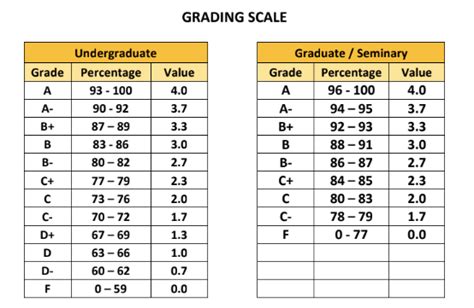Introduction

As a student at the University of Tennessee, it’s crucial to understand the university’s grading scale. The grading system provides a framework for assessing academic performance and plays a vital role in determining academic progress and eligibility for certain opportunities. This article provides a comprehensive overview of the University of Tennessee’s grading scale, including the assigned letter grades, their corresponding numerical equivalents, and the implications for students’ academic achievements.
Official University of Tennessee Grading Scale
The University of Tennessee follows a 4.0 grading scale, where letter grades are assigned numerical equivalents as follows:
| Grade | Numerical Equivalent |
|---|---|
| A | 4.0 |
| A- | 3.7 |
| B+ | 3.3 |
| B | 3.0 |
| B- | 2.7 |
| C+ | 2.3 |
| C | 2.0 |
| C- | 1.7 |
| D+ | 1.3 |
| D | 1.0 |
| D- | 0.7 |
| F | 0.0 |
Grade Point Average (GPA) Calculation
Each letter grade carries a certain number of quality points, which are then used to calculate a student’s Grade Point Average (GPA). The quality points are determined by multiplying the numerical equivalent of each grade by the number of credit hours earned for that course. For instance, an A grade in a 3-credit course yields 12 quality points (4.0 * 3 = 12). The GPA is calculated by dividing the total quality points earned by the total number of attempted credit hours.
Understanding the Implications of Different Grades
Pass/Fail (P/F) Courses
Some courses at the University of Tennessee are offered as Pass/Fail (P/F) options. In these courses, students are not assigned letter grades but rather receive a P (Pass) or F (Fail) designation. A grade of P or F does not affect a student’s GPA. However, it’s important to note that P/F courses may not be counted towards certain degree requirements or prerequisites for other courses.
Incomplete Grades
An incomplete grade (I) is given when a student has not completed all the coursework for a course by the end of the semester. The student must complete the remaining work by the deadline set by the instructor, typically within the following semester. If the work is not completed by the deadline, the I grade will convert to an F.
Grade Forgiveness Policy
The University of Tennessee has a grade forgiveness policy that allows students to retake a course and have the original grade replaced with the new grade. However, this option is only available for courses that are repeated at the University of Tennessee and applies to a maximum of three courses.
Academic Probation and Suspension
Students whose GPA falls below a certain threshold (e.g., 2.0 for undergraduates) may be placed on academic probation. If a student remains on probation for a specified period and fails to improve their GPA, they may be suspended from the university.
Conclusion
The University of Tennessee grading scale provides students with a clear and standardized framework for understanding their academic performance. By comprehending the grading system and its implications, students can make informed decisions about their coursework and plan strategically to achieve their academic goals. Regular consultation with advisors and professors can help students stay on track and maintain a successful academic trajectory at the University of Tennessee.
